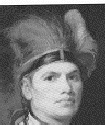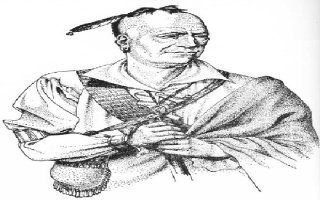
foreword | Historical Narratives | Resources | Links | Contact
TRAGEDY IN UPPER CANADA
History documents the follies and misfortunes of humankind.
As soon as Lieutenant-Governor Simcoe arrived back at Newark in April, 1795 he was greeted by an anxious and agitated Peter Russell. Russell, the Receiver General of Upper Canada, had tragic news which he knew would cause Simcoe grave concern. It pertained to Isaac Brant, eldest son of Joseph Brant,the illustrious leader of the Iroquois Confederacy of the Six Nations which comprised the Cayuga, Mohawk, Onondaga, Oneida, Seneca and Tuscarora tribes.
 |
|
Joseph Brant, Chief of the Six Nations |
According to reliable eye witnesses Isaac Brant had apparently without cause or provocation, "blown out the brains" of a man who had settled on property near the Grand River. The victim, a recent deserter from the American army, was a harness-maker and saddler of some repute whose expertise had promised to make him a valued member of the settlement. News of the tragedy spread quickly throughout the colony. It aroused a great deal of interest in the frontier community because of the stature of Joseph Brant and the importance attached to the maintenance of good relations with the Native peoples especially during these tense times with the United States.
Simcoe's relationship with Joseph Brant was neither close nor cordial and Simcoe feared this might complicate his handling of the serious crime. It was reported that Joseph Brant was overcome by grief over the unfortunate affair involving his oldest son and anxious to ensure it was promptly and properly handled.
A treaty had earlier been negotiated between the Natives and the Superintendent of Indian Affairs, by whose terms the Tribes had agreed to turn over to the civil authority any of their members charged with murder. In accordance with this commitment Joseph Brant confirmed that he would surrender his son up for trial as soon as he could be apprehended. To Simcoe's consternation it was subsequently discovered that the treaty document had mysteriously disappeared. This coupled with Simcoe's strong suspicion that Isaac was being sheltered somewhere on the reserve, resulted in Simcoe nervously notifying Lord Dorchester about the crime and the potential difficulties involved in apprehending the alleged perpetrator. In the event the Aboriginals refused to deliver Isaac up for trial, Simcoe requested specific directions from his superior as to the appropriate, official course of action to follow.
A short time later Simcoe received word from Colonel John Butler, assistant superintendent of Indian Affairs, that the Six Nations had agreed to relinquish Isaac for trial. Native leaders had, however, forewarned Butler that should Isaac be convicted of the crime of murder they would immediately intercede for his pardon. In the event the latter did occur Simcoe wanted direction from Dorchester as to whether it would be proper for Simcoe to "respite the Convict" until His Majesty could decide whether or not to exercise his royal prerogative and pardon the prisoner.
Because Simcoe was anxious to ensure that nothing precipitate was done until he "learned of His Lordship's pleasure," he restrained the Attorney General from applying to the Indian Department for delivery of the accused person up to justice. Much to Simcoe's vexation and annoyance, Dorchester ignored his urgent appeal for advice, his Lordship apparently deciding to leave the crisis for Simcoe to settle. Simcoe decided to do just that. "Since your Lordship has not thought proper to give me directions," wrote Simcoe, he indicated he would proceed on his own initiative and demand the surrender of the alleged murderer. He was prepared if need be, he said, "to use the full force of the country's military might to support the civil power in effecting the arrest of the culprit."
Fortunately for Simcoe, this extreme course of action proved to be unnecessary because of the tragic encounter which took place between Isaac and his father. It happened during the annual distribution of government presents to the Native tribes at Burlington Bay. Isaac, who had a violent temper, suddenly arrived on the scene, approached Joseph, and for some unknown reason began verbally to abuse his father, calling him all manner of opprobrious epithets. In a sudden rage, Isaac grabbed his knife and stabbed out at Joseph, wounding him badly on the arm as Joseph attempted to ward off the blow. In self-defence Joseph drew his dirk, and during the struggle which ensued inflicted a severe scalp wound on Isaac's head. The two men were parted by those present. Isaac refused all offers of medical assistance and set off for his home along the Grand River. His undressed wound became badly infected and within a few days it proved to be fatal.
In reporting to Dorchester on the outcome, Simcoe remarked: "In attempting to assassinate his father, this dangerous young man fell victim to his own atrocity." On learning of his son's death, a distraught Joseph Brant turned himself in to the authorities, and within a short time was exonerated of all wrong-doing. The tragic encounter and its grievous outcome haunted Joseph for the remainder of his days. |
|
Thayendanagea - Joseph Brant, Chief of the Six Nations |
Copyright © 2013 Website Administrator